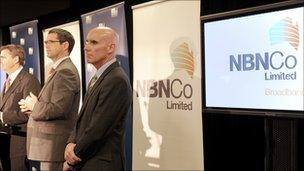Australia strikes broadband deal with Telstra and Optus
- Published

Australia's two biggest telecoms companies have joined the government's A$36bn (£24bn) plan to roll-out high-speed internet across the country.
Telstra and Optus will close down their infrastructure and transfer customers to the state-owned National Broadband Network Company (NBNC).
About 60% of households have broadband, but speeds are slow compared with many industrialised countries.
The plan is to connect more than 90% of households to a super-fast network.
Shifting market
The two telecoms companies already have extensive broadband operations, but the government said it would be more economical to bring all the parties together.
Telstra estimates it could make about A$11bn over several decades from the new deal as it will earn revenues through disconnection payments as well a share of profits from the new network.
Optus, owned by Singapore Telecommunications, will make about A$800m.
"Two major telcos have now signed on with the NBNC and that will mean a very strong take up," said Australia's Treasurer Wayne Swan told reporters.
"This will, of course, completely change the market structure in Australia," he said.
Broadband speeds in Australia are lagging behind many other countries, according to a measure used by the Organisation for Economic Cooperation and Development (OECD).
The OECD says that the average advertised broadband speed in Australia was 3.24 megabits per second in 2010. That is less than the average for all OECD nations of 3.75 megabits per second.
The difference in speeds is blamed on the huge distances and rough terrain that makes connecting the towns and cities across Australia an expensive investment.
Opposition
The aim is to deliver broadband speeds of 100 megabits per second to homes, schools and businesses.
Only a few countries, including South Korea, Japan, and Germany, currently achieve such speeds.
Prime Minister Julia Gillard has made wiring-up the country with fibre optic cables a key policy platform.
But opposition parties have called the project a costly folly and promised to review the plans should they ever get into government.
The deal still needs approval from a vote by Telstra shareholders on 18 October and clearance from the competition watchdog.